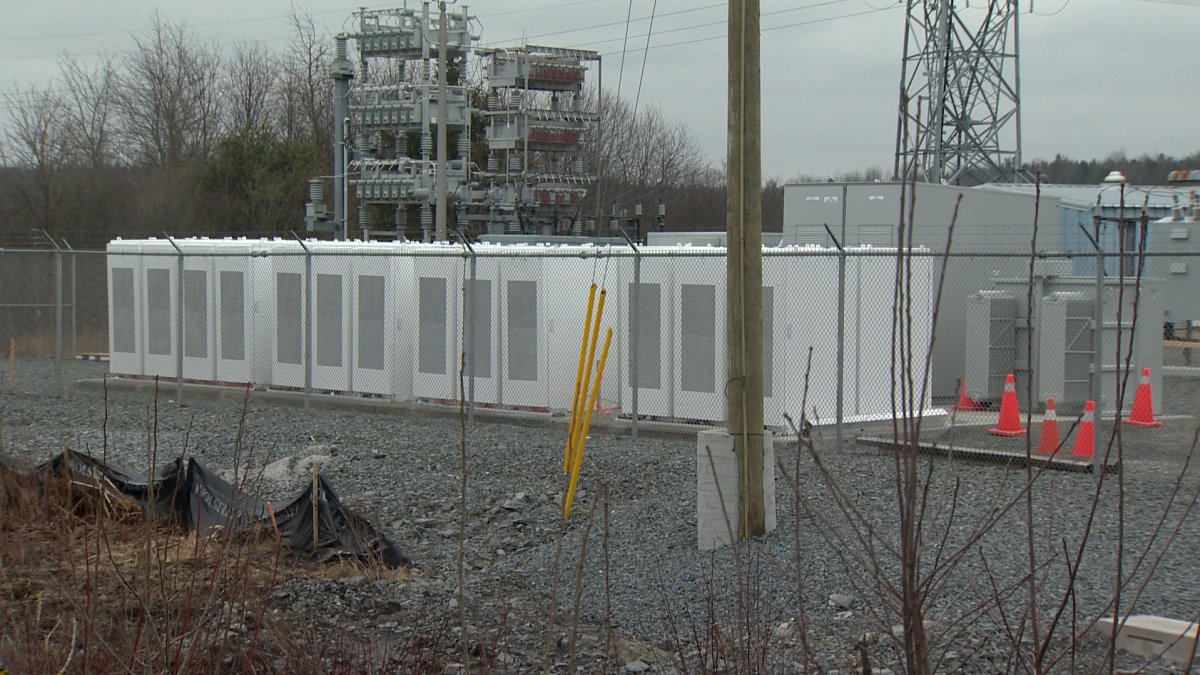Nova Scotia Power is testing Tesla batteries in a pilot project exploring how they can be used to provide a more reliable power supply.

A couple dozen battery compartments, each about the size of an enclosed portable toilet, have been installed at an electrical substation in Elmsdale, N.S.
The modular arrangement is called a Powerpack system; essentially a giant rechargeable battery.
A smaller-scale system was installed in Australia.
“The wind blows when it blows, the sun shines when it shines, but people like to watch TV at night,” Jill Searle, the NSP’s Smart Grid manager, said at the site.
The challenge the company faces is that renewable energy, such as solar and wind varieties, doesn’t always provide a consistent stream of power.
Until now Nova Scotia Power didn’t have a way to store the power.
READ MORE: Thousands without power in Nova Scotia as intense winter storm begins
The new system, which is partly powered by wind turbines in the area, will change that, filling in power gaps.
“If there’s no wind, it’ll provide energy. If there’s too much wind, it can absorb it for later use. So it allows us to have a larger component of renewable energy in our system,” David Swan, a DHS Engineering engineer who will help get the system running, said.
The system will be used in various situations, including power outages. Searle said the system can power approximately 300 homes.
“We would expect a battery like this, during a cold winter night, to perhaps last for a two-hour duration, but in the summer time when it’s a little lightly loaded, we could expect the battery to last for much longer,” she added.
According to Nova Scotia Power spokesperson Tiffany Chase, power outages in the province last an average of two hours.
Multi-million dollar project
The Intelligent Feeder pilot project runs until 2019 at a cost of $3,408,302; Sustainable Development Technology Canada contributed $625,918.
As part of the project, 10 Tesla Powerwalls have been installed and activated at the same number of homes in the area. These rechargeable batteries can power an entire home for days depending on power usage and the number of ‘walls installed.
READ MORE: Tesla to install Atlantic Canada ‘supercharger’ stations for its vehicles
“Our goal is to be able to understand how battery technology can help integrate into our system, how it can benefit the utility, and how it can benefit customers,” Searle said.
The plan is to turn on the Powerpack system, a permanent addition, by the end of this month.
- Invasive strep: ‘Don’t wait’ to seek care, N.S. woman warns on long road to recovery
- Ontario First Nation declares state of emergency amid skyrocketing benzene levels
- Do Canadians have an appetite for electric vehicles? Experts are divided
- Nearly 200 fossil fuel, chemical lobbyists to join plastic treaty talks in Ottawa





Comments